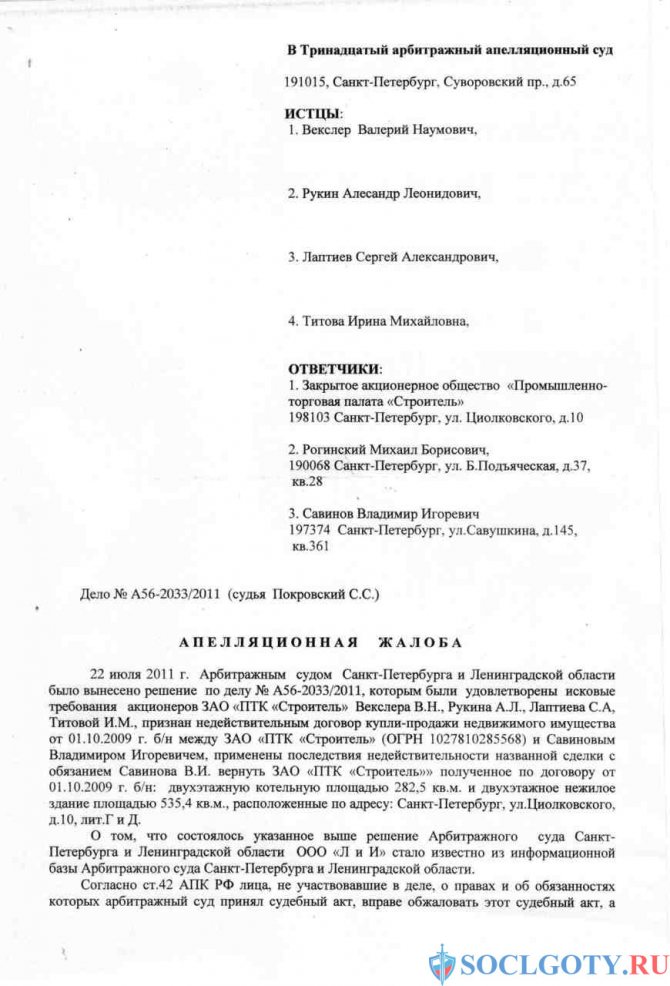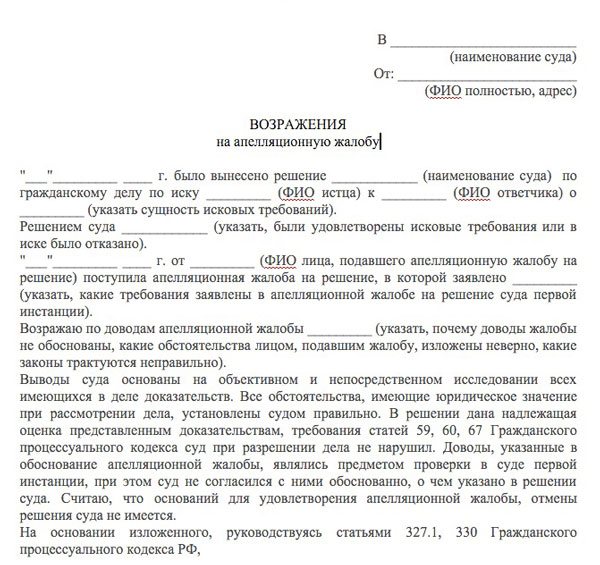Objections in civil, criminal, and arbitration cases
Criminal cases are heard by a magistrate or federal judge (depending on the severity of the crime that was committed).
Attention! An appeal against a decision or order of a magistrate is sent to the district court to the federal judge for the relevant area. But the complaint itself must be addressed to the magistrate who heard the case, so that he prepares materials and sends them to the district court.
Civil cases in the courts are also heard by magistrate and federal judges. The appeal procedure is similar to criminal procedure rules.
Attention! An appeal against a district court verdict is submitted to a regional or republican court in a criminal panel through the district court, which forms the case and sends it to the second instance.
The Arbitration Procedure Code provides for the possibility of filing complaints and objections via the Internet. This will greatly facilitate the task and extend the deadlines (all documents are considered received by the court on the day they are uploaded to the court website).
Objections to an appeal for alimony
Alimony is collected on the basis of a court order. If the amount of claims exceeds 50 thousand rubles, then a decision is made by the district court.
Expert opinion
Orlov Denis Ignatievich
Lawyer with 6 years of experience. Specialization: family law. Has experience in drafting contracts.
When appealing against judicial decisions, an appeal is filed by a person who does not agree with the decision. Often such disputes are resolved in favor of the child and the parent with whom he lives.
The appeal may include arguments regarding the amounts awarded and their amounts. The participant in the case, in whose favor alimony was collected, has the right to file objections to the complaint. If the obligation to write a review is not fulfilled, the case may be considered by the appellate authority based on the available materials.
The importance of objections to the appeal is due to the peculiarities of the appeal procedure as a whole, which is aimed not at considering the evidence itself presented by the parties, but at considering the correctness of the assessment of the evidence by the court of first instance.
Objection to the appeal: so that there are no surprises
Until you decide whether you need to file an objection to the appeal or let everything take its own course.
Before you make a choice, think about the consequences that your inaction may lead to.
Why do they refuse to file objections to the appeal?
There may be many reasons, but such people can be divided into two groups.
The first group is thrifty
They do not want to bear the costs of paying a lawyer to prepare objections to the appeal.
The second group is arrogant
They believe that “our cause is just, the court’s decision is legal and we will win again.” They see no point in filing objections to their opponent’s complaint.
Now imagine the following situation
At the appellate court hearing, you verbally object to the complaint and support the appealed decision.
Despite this, the court overturns it and takes the side of the enemy. What happened in this case?
Having won in the court of first instance, you were unable to defend your victory in appeal.
We've been through so much and this is the result - defeat after victory
But everything could have been different if you had submitted to the court in advance a written objection to the appeal.
Appeal and cassation proceedings
A complaint by any party against a decision of the court of first instance contains not only a listing of the justifications for the party’s position given at the court hearing, but also criticism of the court’s assessment of evidence, which, in the opinion of one or another participant in the process, led to an incorrect decision, from his point of view.
The importance of competently drafting an appeal or cassation complaint and objections to it is due to the fact that the second instance does not consider the case on its merits, but only evaluates the evidence that was considered in the court of first instance.
At the same time, in the appeal process, oral presentations by the parties are of a formal nature and are reduced only to a statement of the content of the complaint. That is, it is the complaint and objections to it that become the subject of study by the panel of the appellate court.
Contents of objections
When drawing up objections, one should proceed from what is stated in the cassation or appeal itself.
Thus, the arguments presented in the objections will become a refutation of the arguments presented in the complaint of the opposing party.
When refuting the arguments of your procedural opponent, you cannot refer to new circumstances that were not studied during the court hearing. New circumstances mean some new evidence that the court of first instance was unaware of.
An exception to this rule is made in the only case provided for in Article 327.1 of the Code of Civil Procedure of the Russian Federation. By virtue of this article, any of the parties can bring new evidence to the appellate instance only if its provision in the court of first instance was impossible for reasons beyond the control of the party.
Moreover, the right to provide such evidence can be obtained only if the appellate authority recognizes these reasons as valid and makes an additional ruling on this matter.
The arguments of the objections should be supported not by attached documents, but by references to the materials of the civil case.
References are made by indicating the case sheet, which contains this or that evidence, for example, when referring to the examination report, you should indicate “case sheet No._____”.
Each point of objection must contain a refutation of the corresponding point of appeal as unfounded and not consistent with the materials of the case. To put it simply, a complaint and an objection to it are an attempt by each party to compete for the positive opinion of the members of the appeal board.
Decor
Objections to the appeal are drawn up according to the general rules for drawing up reviews of procedural documents.
Objections begin with the so-called “header”, which includes:
- name of the addressee, that is, the name of the appellate and cassation authority;
- name (full name) of the author of the objections, his place of residence and procedural status (plaintiff, defendant, representative of one of the parties, third party).
Immediately under the heading, with the words “Objections to the appeal in case No. ________,” the descriptive part of the document begins. The descriptive part must necessarily include:
- the essence of the claim and the names of the parties to the claim;
- information about the date of the decision of the court of first instance and its contents;
- information about the content of the appeal (cassation complaint);
- refutation of the arguments of the complaint with references to the sheets of the case, which the arguments of the complaint contradict.
The descriptive part ends with the words “based on the above, P O SHU”, after which the operative part begins, containing a direct request to the appellate authority to accept the arguments of the objections and reject the arguments of the complaint.
The text of the document ends with the date of drawing up the objections and the signature of their author.
There is no need to attach any documents to the objections to the complaint, since, as mentioned above, the appellate instance only considers evidence that was studied during the consideration of the case, that is, already available in the case file.
How to make an objection correctly
The response to the appeal must be submitted in writing. There are no requirements regarding the form of the document, so you can stick to the usual form. All you need is to follow the basic rules of office work.
The Code of Civil Procedure of the Russian Federation (Article 131) will help you understand how to draw up an objection to an appeal.
In accordance with it, the text of the document reflects the following information:
- The name of the judicial authority to which the appeal is sent, with its address;
- Information about the applicant who filed the complaint (his full name, registration, residence address and procedural status are indicated);
- An indication of the appeal to which the objection is being drawn up;
- List of documents and applications, if necessary;
- The author of the objection signs it.
Attention! See an example of objections to an appeal:
A clear, consistent and well-founded presentation is required.
It is this approach that can positively influence decision making: there are more chances for a positive outcome.
But it would still be better to use a sample objection to an appeal.
This way you can avoid mistakes at the initial stage of document preparation.
Additionally, it is written for what purpose the objection is being drawn up, what exactly the applicant is trying to achieve when filing it.
To which court are objections to the complaint filed?
Objections to a complaint, unlike the complaint itself, can be filed both with the court that made the decision and with the appellate (cassation) instance. This is due to the fact that objections are a procedural document derived from a complaint. That is, in order to write objections, the party needs to know about the fact of its existence and at least read it.
A copy of the complaint is sent to the opposing party, usually by mail. In this case, the mail may not reach or not reach the opposing party for any other reason, which means that the participant in the process may not have time to write objections before the case is sent for consideration to the appellate instance.
Since writing objections to a complaint is not a procedural obligation of the participants, the absence of objections will not prevent the start of appeal proceedings.
- Objection to the petition
- Objection to a court order
- Objections to the on-site tax audit report
- Objection to counterclaim
- Objection to the statement of claim to the arbitration court
Zen! Zen! Zen! Our Yandex Zen channel has even more special legal materials in a convenient and beautiful format. Subscribe now →
How to correctly formulate objections to an appeal? In what cases should you write objections? How to sue them?
We will tell you everything about objections to an appeal in a civil case. Download the sample. Ask questions to lawyers.
| Note! |
| Feedback on the appeal |
The court's decision in the case is made in favor of one of the parties to the dispute. Persons participating in the case who are not satisfied with the court's decision can appeal it on appeal. When receiving an appeal from the court, you can react with silence, you can file your own appeal, or you can write objections to the complaint.
Objections are filed if the court decision completely suits the applicant, and the other party in the appeal brings arguments that completely contradict the circumstances established during the proceedings.
Where to send an objection and when should it be done?
There is no strict limit on where you can file your appeal. It can be accepted either in the district court or in the appellate court. In addition, the review can be brought directly to the court hearing regarding the consideration of the complaint, but in this case, you must remember that it will be taken into account only if you provide it for review before the verdict is announced.
While the legislation clearly defines the deadlines within which a person filing an appeal must meet, no such framework is established regarding when to file an objection. There is a wording - a reasonable period. It is established by the court based on many nuances relating to the case under consideration, such as:
- Type of process (the deadlines for filing objections in criminal, civil and arbitration cases differ);
- The deadline for delivery to the winning party of notification that an appeal has been filed against the decision in their favor;
- The volume of material presented in the appeal;
- The complexity of the initial case.
If necessary, you can always write a statement and increase the deadline for filing an objection by court decision.
Drawing up and filing objections to the appeal
Expert opinion
Orlov Denis Ignatievich
Lawyer with 6 years of experience. Specialization: family law. Has experience in drafting contracts.
Objections are drawn up after the court has accepted the appeal against the court decision. In this case, the appeal is sent to the participants in the civil case. They are invited to submit their objections within the deadline set by the court.
Objections to the appeal should be addressed to the appellate authority, the name of which is indicated in the header. There you must also indicate the details of the person submitting your objections (full name and address).
Be sure to indicate the name of the document: Objections to the appeal.
In the text of the objections, describe your position, indicate the reasons why you do not agree with the appeal. Sign the objections and date them.
Objections are submitted to the court that considered the case at first instance; documents confirming the existing objections can be attached to the objections. Objections are submitted with copies according to the number of participants in the case. The state fee when filing objections is not paid.
Drawing up a document
The sample response to an appeal to the arbitration court is not approved by law. There are also no requirements for the text in the Arbitration Procedure Code of the Russian Federation. The document contains the following provisions:
- name of address, location;
- applicant's details (full name or name, address);
- information about the case: the subject of the dispute, where and when it was considered, information about the parties, the essence of the court ruling;
- an indication that a complaint against the decision has been filed;
- a listing of the arguments specified in the appeal, with comments from the author of the review;
- references to evidence, rules of law or court findings;
- assertion that the arguments in the complaint are not substantiated, the decision in the case is legal;
- references to Article 269 of the Arbitration Procedure Code of the Russian Federation (327.1 and 330 of the Code of Civil Procedure of the Russian Federation);
- the requirement to uphold the decision of the first instance;
- the applicant’s signature, surname and initials, date of preparation of the document.
Postal documents confirming the sending of copies to the participants in the case should be attached to the appeal (Article 262 of the Arbitration Procedure Code of the Russian Federation). If the review was signed by a representative, then a power of attorney confirming the relevant authority of the person should be attached.
Since the form has not been approved, the name of the document may vary. Some applicants write reviews, others write objections. This does not affect the order of consideration.
When preparing a response to an appeal to an arbitration court, you should focus on the applicant’s arguments and justify, referring to the case materials, the inconsistency of the claims.
Example: a statement was received from the defendant, where the party refers to the transition to the main proceedings during the preliminary hearing as a circumstance that caused the impossibility of protecting interests. The plaintiff should indicate that the other party to the dispute presented all available evidence, fully participated in the consideration of the case, and would not be able to support the position with other arguments if the analysis on the merits took place in a few days.

Deadline for filing objections to the appeal
The deadline for filing objections to an appeal in a civil case is determined by Article 325 of the Code of Civil Procedure of the Russian Federation and paragraph 15 of the Resolution of the Plenum of the Supreme Court of the Russian Federation “On the application by courts of the norms of civil procedural legislation governing proceedings in the court of appeal.”
According to this norm and clarifications of the highest court, the deadline for filing objections is set by the court of 1st instance. Persons participating in the case are informed about the deadlines in a notice, which is sent as a covering letter to the appeal.
The period for filing objections must be reasonable, which means taking into account the time required to send and deliver postal correspondence, the territorial distance from the court of residence or location of the persons participating in the case, the volume of the appeal, presentation, complexity of the case and other significant circumstances.
Typically, the deadline for filing objections is within the one-month period established for appeal, but it can be extended taking into account the factual circumstances.
| It is important! |
| The deadline for filing objections to an appeal in a civil case is established by the court |
It should be noted that the deadline for filing objections to an appeal is not preemptive. This means that objections filed outside the deadlines established by the court will still be accepted by the court.
However, since the court is obliged to familiarize other participants in the civil case with the received objections, late filing of objections may lead to a delay in the consideration of the case or to the postponement of the court hearing.
In fact, objections to the appeal can also be submitted to the court hearing of the appellate instance.
Rules for drawing up an objection to a refutation in an administrative process

Just like the objection in a civil case, the response to a rebuttal in an administrative proceeding contains mandatory sections. Let's look at the standard components:
- Objection header
- Descriptive part.
- Objections.
- Resolution.
- Date and signature.
The text of the objection to refutation indicates whether the person intends to take part in the court hearing. If there is no such desire, then a request is made to consider the case in his absence.
The party who has grounds for filing such a rebuttal must sign the objection to the appeal. The representative has the same powers, who can present a paper on the legality of his rights if the step was not completed at the stage of the initial consideration of the case.
Important!
If the interested person cannot personally represent himself in court, then the rights can be delegated to an official representative with the appropriate power of attorney.
Features and deadlines for submission
File a refutation of an appeal in an administrative case to the court at the place where the initial decision was made. The second filing option is the place where the complaint that is being disputed is received. The text of the objection is read out in court after the appeal is announced. Based on the requirements of Article 262 of the Arbitration Procedural Code, a party has the right to submit an official response to the appeal within a period that allows them to familiarize themselves with its text before the start of the trial (the content of parts 1, 2, 262 of the Arbitration Procedural Code).
Documents attached to the objection to the appeal in the administrative case:
- notification of delivery of copies of the objection to all participants in the process;
- power of attorney to delegate rights to an authorized person (if he has not previously participated in the process);
- written evidence supporting each argument.
Attention!
The appellate court does not have the right to consider claims that were not stated in the primary claim.
Sample objections to an appeal
In ____________________ (name of court)
From: ___________________ (full name, address)
Objections to the appeal
“___”_________ ____, a decision was made on ____________ (name of the court) in a civil case on the claim of _________ (full name of the plaintiff) against _________ (full name of the defendant) about _________ (indicate the essence of the claims). Court decision ____________ (indicate whether the claims were satisfied or the claim was denied).
“___”_________ ____ dated _________ (full name of the person who filed the appeal against the decision) an appeal against the decision was received, which stated _________ (indicate what requirements were stated in the appeal against the decision of the court of first instance).
I object to the arguments of the appeal _________ (indicate why the arguments of the complaint are not substantiated, what circumstances were stated incorrectly by the person who filed the complaint, what laws are interpreted incorrectly).
The court's conclusions are based on an objective and direct examination of all the evidence available in the case. All circumstances of legal significance during the consideration of the case were correctly established by the court.
The decision gave a proper assessment of the evidence presented; the court did not violate the requirements of Articles 59, 60, 67 of the Civil Procedure Code when resolving the case. The arguments cited in support of the appeal were the subject of verification in the court of first instance, and the court did not reasonably agree with them, as indicated in the court decision.
I believe that there are no grounds for satisfying the appeal or canceling the court decision.
Based on the above, guided by Articles 325, 330 of the Civil Procedure Code of the Russian Federation,
Ask:
- Leave the court decision dated “___”_________ ____ in the case unchanged, and the appeal is not satisfied.
List of documents attached to the objections (copies according to the number of persons participating in the case):
- Copy of objections
- Additional evidence supporting existing objections
Date of filing objections “___”_________ ____ Signature of the applicant _______
objections:
Objections to the appeal
to “Objections to the appeal”
In the court of appeal it is impossible to change the claims; they will be the same as those considered by the court of first instance.
Try it, it definitely won't get any worse. But most likely you need to file a new claim with new claims.
I read in the information posted on your website on the page “Objections to an appeal” that “Objections are filed with the court that considered the case at first instance; documents confirming the existing objections can be attached to the objections.” Please explain whether I understood correctly that it is possible to attach to objections to an appeal not only documents that were previously attached to the statement of claim and taken into account when making a decision, but also new evidence of the wrongness of the party filing the complaint?
You can attach new documents to the appellate court, but in the text of your objections you must justify the impossibility of submitting them to the court of first instance.
Please tell me which articles I can refer to in order to file an objection to the appeal. On December 14, the district court ruled to recognize the right to confer the title “Veteran of Labor.”
And on January 11, the Department of Social Development filed an appeal against the court’s decision. What should I do? Please help me file a written objection to the appeal.
Expert opinion
Orlov Denis Ignatievich
Lawyer with 6 years of experience. Specialization: family law. Has experience in drafting contracts.
Submit your objection using this template. Indicate that you agree with the court's conclusions and ask that the decision be left unchanged. It would be enough.
I used your sample. I hope everything works out. Everything is clear and accessible. Thank you!
Please tell me whether it is necessary to attach to the objection to the appeal the copies of documents that have already been attached to the objection to the statement of claim to the court of first instance? Or just new evidence? And is it worth listing the evidence that was already listed in the first objection?
The appeal is sent to a higher court with the materials of the civil case, where objections and other documents are filed. Therefore, there is no need to re-attach to the complaint any documents previously attached to the case materials. The appendix lists only those documents that are actually attached to the appeal.
Good afternoon Please tell me what is the right thing to do. The district court decided to award me the title “Veteran of Labor”; the Department of Social Development filed an appeal.
Your “Objection” form helped me understand exactly how to draw up this document. Thank you very much! But it’s not entirely clear to me what documents I should attach to the objection.
What does “Copy of Objection” mean? Am I filing one objection and attaching a copy for the Department? And what other documents should I attach to the objection? All documents again (copy of work record book, copies of awards, copy of passport, etc.) Or do you no longer need to attach the documents, because they are already in court? Thank you so much for your help!
To the objection to the appeal you attach only 1 copy of this objection for the defendant. All other documents are already in the civil case, so there is no need to attach them anymore. Good luck to you!
Can I file an objection without being in court? What will be the decision if the defendant does not agree with the amount of the examination carried out on the flooding of the apartment, and the repairs have already been made. There are no documents for repairs because... I didn’t think they would file an appeal.
You can write an objection and not be present in court. If the court made a lawful decision, your participation will not change anything. In the absence of documents confirming the costs of repairs, its cost is determined by an expert’s opinion. The defendant must somehow motivate his disagreement and present an alternative calculation of the damage caused.
Good afternoon Please tell me, the defendant filed an appeal against the court's decision. Does the Defendant have the right, directly at the court hearing, to supplement the complaint with a statement demanding a reduction in the fine to protect consumer rights? The fact is that the Defendant made this statement to the court of first instance, but indicated other circumstances to reduce the fine.
Does the defendant have the right in an appeal to state new circumstances that the Defendant did not indicate in the court of first instance?
The defendant has the right to supplement the complaint with new arguments, but to do this he must formalize his application in the form of an additional appeal. Reference to new circumstances is possible; it is impossible to present only new evidence without justification.
Hello, please tell me whether it is necessary to list the arguments that are already described in the decision of the first instance court in the objection to the appeal.
No, you don't need to do this. Describe your position on the complaint and ask that the court's decision be left unchanged.
If I am late in filing an objection, will the court consider this complaint?
The court will consider the appeal without objection.
Is it possible to file objections directly in court on the day of the hearing?
Objections are filed with the court of first instance. Receipt of objections directly to the appellate court may lead to postponement of the case and delay in consideration of the complaint.
The defendant believes that the district court's decision is illegal. On the grounds that the court did not order an auto technical examination on its own initiative.
Write your objections using this example.
The court ruled to partially satisfy the claim. The bank filed an appeal that it did not agree with the court's decision. Is it necessary to write an objection to the appeal?
Filing objections to the appeal is not required. But, if the court’s decision suits you, it is better to support it with your objections.
When a claim is filed in court, the case is considered and a decision is made. However, in order to support the adversarial nature of the judicial process, the legislation makes it possible to continue the consideration of the case by filing an appeal.
Expert opinion
Orlov Denis Ignatievich
Lawyer with 6 years of experience. Specialization: family law. Has experience in drafting contracts.
Thus, the previously defeated party can initiate continuation of the proceedings in court. The other party has the choice of doing nothing in response or filing an objection to the civil appeal.
Why is feedback needed?

The logical end of the trial is the issuance of a court ruling resolving the controversial situation. The parties to arbitration usually have different ideas about the fairness of the decision. Therefore, after the city court or magistrate makes a decision, the legislator provides the losing party with the opportunity to challenge the result of the case and gives time to appeal it.
The right of a person who considers a decision made by an arbitration court to be unlawful is to appeal it by appealing to higher authorities. According to the principles of equality and competition between the parties, persons who disagree with the requirements of the appeal have the right to present counterarguments and objections to the stated requirements by sending a response to the appeal.
A review is often confused with the concept of an objection to an appeal. However, according to the provisions of the law, these are two separate documents.
An objection is a complete disagreement with the arguments of the appeal; a review is a broader concept that can include both an objection to the arguments and partial agreement with them.
In arbitration, unlike civil proceedings, writing a review is the direct responsibility of the participants in the process, and not their right. Therefore, interested parties must state in writing their position in relation to all arguments raised in the appeal.
Some participants in the process do not understand why they should write objections to a complaint and treat this formally.
Meanwhile, in the current procedural practice, writing a review helps:
- Bring to the attention of the court the position of the participant in the process. Otherwise, during the consideration, only the opinion of the person who filed the appeal will be taken into account.
- The response with its arguments is attached to the case and will help in the future to prove that in the first instance the participant’s position was brought to the attention of the court, but was not taken into account by it.
- The re-hearing will be held by another judge, who may have an opposite position on resolving the dispute under consideration. If you do not provide the available facts and evidence, then it will be quite difficult to convince the court of the correctness of the position of the reviewer.
An informative review with procedural and civil legislative norms and a sufficient evidence base will help the court to correctly assess the legality and legality of the previously made decision and leave it unchanged.
In order to argue your position, you can attach to the document:
- a petition to obtain documents (evidence) that were not considered earlier, but are important for the correct consideration of the dispute on the merits;
- opinion of a competent specialist or expert about a controversial situation;
- judicial practice of other higher authorities that made decisions on similar cases.
If the review is provided untimely, the court has the right to conduct a review only taking into account the evidence available in the case.
When and where to go
The plaintiff who wins it at the first stage has the right not to take any steps at this moment, just wait for the start of the court hearing. He also has the opportunity to write an objection to the appeal.
When the court accepts this document, it notifies all parties to the proceeding. After this, you need to carefully study it, competently draw up an objection and collect the necessary package of documents.
He is brought to the court where the hearing of the case took place. This must be done within a month. The court has the right to extend the period.
When filing, it is necessary to prepare the document in the required number of copies so that it is received by the court and the parties participating in the trial.
Documents for participants can be sent by mail. In this case, you need to use registered letters with acknowledgment of receipt and a description of the attachments. In this way, it will be possible to later confirm that the requirements for sending papers have been met if you save the postal receipts.
How to write
To make your position more convincing, it is recommended to outline your approach, present your own arguments, supported by evidence.
The subject of objection may be the appeal as a whole, or only certain parts.
Where to begin
In order to draw up the most effective document, you need to remember that the complaint is written in response to an appeal.
When compiling it, you need to consider the following.
| What to do | Why is it important |
| Study the appeal | The main point of the objection is to deprive it of persuasiveness in the eyes of the court |
| Refute arguments | It is necessary to show the inconsistency of attempts to revise the original decision |
| State your approach | Convince the court of the correctness of your view of the situation |
| Validity | The importance of using legal references and documentary evidence |
The analysis of the arguments presented by the opponent must be evidential and confirm the correctness of the author of the objection.
When drawing up an appeal to satisfy it, it is not allowed to use arguments or mention facts that were not raised during the initial consideration by the court of first instance. If the opponent resorts to such methods of persuasion, this must be indicated when drawing up an objection.
In such a situation, the author of the appeal abuses the right to present evidence, violating the Code of Civil Procedure of the Russian Federation.
How to work with arguments
When conducting a judicial review, the legislation ensures that the parties are adversarial. The losing party in the case seeks to challenge the decision. The appeal presents a view of things that is sometimes confusing, obscuring the essence of the situation at hand.
Filing a complaint clarifies this document for the judge and creates a more correct coverage of the case from the point of view of the other side.
When analyzing an opponent's arguments, it is necessary to examine each argument presented by him for procedural distortion of facts. When found, it is necessary to note them and provide arguments as to why exactly this took place.
Since these circumstances were considered by the court of first instance, the participants in the trial may question the competence of the judge who presided over this case.
If during the trial the question of replacing the judge was not raised, then we are talking about an attempt to reinterpret, misinterpret his conclusions, which can be considered as an abuse of the opponent’s right to appeal.
General concepts
Appeal is the process of challenging a court decision at a higher authority. A review of the case is initiated by filing a corresponding petition. During the review process, such a concept as an objection or response to an appeal against a court decision often comes up. What is it?
An objection is the reaction of one of the parties to the process, which agrees with the initial decision of the court. With her petition, she expresses a claim with the opinion expressed in the appeal by another participant. Its presentation is justified if the opposite side claims contradictory, untrue circumstances.
On a note!
More often, the interested party submits a written response to the complaint. But the sample proposed below can be used as a set of necessary information for forming an oral appeal.
An objection can be used to refute the opponent’s arguments as a whole or individual statements or evidence. Objective facts must be presented that fully support the validity of the claims.
Grounds for filing a response to the appeal:
- false information;
- evidence obtained by unlawful means;
- conflicting circumstances;
- other circumstances identified during the filing of the appeal.
Art. 327 of the Code of Civil Procedure provides for the right of the parties to file a response.
What to pay attention to
- It is important to convey to the court your view of the situation, supporting it with legal references to articles of regulations, confirming your position with facts and documents.
- We must take time to analyze the arguments presented. If the opponent claims that the evidence was previously misjudged, then the question must be raised as to whether the other party previously made comments on this topic during the consideration of the case.
- Minutes are taken during meetings. It reflects what was said during the trial. If there were no objections to the arguments, then both sides agreed with their correctness and validity.
By presenting the objection in this way, there is reason to conclude that the process was conducted flawlessly and there is no basis for filing an appeal.
Sample 2020
There is no special form provided for filing a complaint. The document must be prepared in writing. There is no need for certification by a notary.
In practice, a document format has developed that is recommended to be followed when describing it:
- The top line must contain the exact name of the court to which the complaint is being filed. You must indicate the address of its location.
- The author of the complaint indicates personal information, his name and position in this lawsuit.
- The main part of the text lists the details of the appeal statement against which the complaint is being written.
- It is necessary to specifically indicate in the text what exactly the author of this document is asking for.
- Next, his point of view is stated and convincing arguments are given to confirm that he is right.
- A list of attached documents is provided.
- At the end of the text, the author's signature must be placed , a transcript must be provided, and the date the complaint was written must be indicated.

Example of using a document
If a situation arises where an interested party files a complaint to a court of second instance, seeking to overturn a decision made by the court, the defendant needs to protect his interests.
After receiving a copy of the document, a document is drawn up, the purpose of which is to leave the previously made decision of the trial court in force.
This situation needs to be illustrated with an example of the effective use of an objection to an appeal.
In this case, the subject of the judicial review was that the defendant, when examining the case in the court of first instance, did not pay for the received consignment of goods. The court recognized the payment arrears and ordered the defendant to pay:
- missing amount;
- interest for its use;
- state fee for going to court;
- payment for representative services.
The defendant based his appeal on the fact that the procedure for considering the case was violated - he was not notified of the trial.
The objection to this complaint was based on the following arguments.
- The Unified Register indicates the legal address of the company to which the notification was sent.
- An attempt was made to hand over the relevant documents personally to the director, which he evaded. An act was drawn up reflecting this fact.
- The post office sent notifications three times that documents were needed, but a company representative did not show up to collect them.
According to Article 123 of the Arbitration Procedural Code, it is considered that under the specified conditions (the documents were sent to the official legal address no later than 15 days before the start of the consideration, a notice was sent, but the recipient did not come for the documents), the defendant is considered to have been properly notified by the court.
The objection states that the defendant did not put forward any documents on the merits of the case, did not challenge the decision as a whole or part of it, and did not point out its groundlessness.
Expert opinion
Orlov Denis Ignatievich
Lawyer with 6 years of experience. Specialization: family law. Has experience in drafting contracts.
Here the arguments of the filed complaint were considered and its groundlessness was proven. This led the judge to uphold the earlier decision of the trial court.








